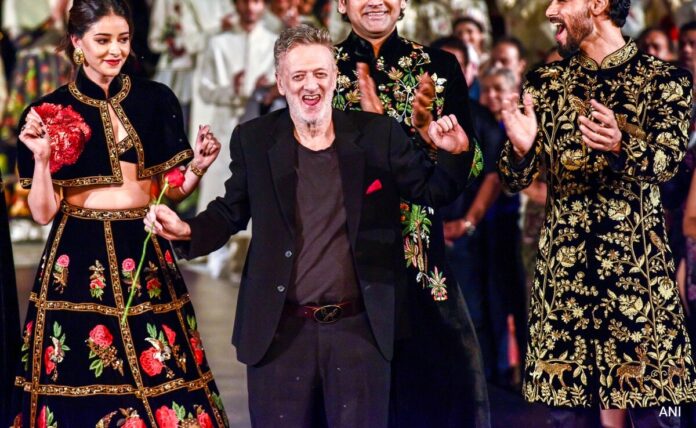Rohit Bal described himself as a designer who combines “history, folklore, village craft and dying arts”.
New Delhi:
“A king among designers. A prince among men.” At his comeback show last month, now his last show, a visibly weaker Rohit Bal walked hand-in-hand with actor Ananya Panday as models sashayed down the Lakme Fashion Week ramp in rich designs and elegant silhouettes.
Though a prolonged cardiac illness impacted his physical health and public appearances, his work showed that he continued to own the title bestowed on him by the TIME magazine – ‘The Master of Fabric and Fantasy’.
Rohit Bal, lovingly called ‘Gudda’ but also termed ‘Enfant terrible’, is synonymous with shows that broke norms, remained timeless and to this day offer an unparalleled definition of luxury-meets-modernity. Case in point, his 2015 show against the backdrop of the Qutub Minar, or a gender-bender show featuring male models in ghagra skirts and sindoor. And then there was his historic Lodhi show, where models wore richly-embroidered outfits and walked into a pool, resembling lilies and lotuses. (Fun fact: He, too, later jumped into the pool!)
Rohit Bal drew inspiration from his Kashmiri heritage, with floral and peacock motifs becoming synonymous with his label launched in 1989. The embroidery was rich and his deep understanding of Indian textiles was evident. His expertise lay in marrying luxurious fabrics, bold colours, detailing and silhouettes to put on display the cultural heritage of India.
It is no wonder then that his label expanded quickly to the Middle East and Europe and his designs adorned a plethora of Indian and international personalities, including Amitabh Bachchan, Aishwarya Rai Bachchan, Kareena Kapoor Khan, Sonam Kapoor, Uma Thurman, Cindy Crawford, Naomi Campbell and Pamela Anderson.
On his website, Bal described himself as a designer who “combines the right mix of history, folklore, village craft, and dying arts to create imaginative and innovative masterpieces for catwalks and fashion talks”.
Long before the age of mass apparel production leading to movements advocating equitable earnings of artisans, Rohit Bal’s emphasis on the craftsman’s contribution was evident in his work. He also played mentor to many designers in he 1990s, including Pankaj and Nidhi and Sahil Kochhar.
He dipped his toes in the world of food, opening the rustic Veda and laidback Cibo in Delhi. Rohit Bal also found his way to the silver screen, appearing in Hollywood film True West and Indian films Monsoon Wedding and Boom.
Rohit Bal called his last show ‘Kaynaat’ a celebration of “the bloom of life and beauty”. Like all his work in a career spanning over three decades, the collection is a reminder that classic elegance outlives time, generations and an ever-changing fashion aesthetic. As the curtains come down on the designer’s illustrious life, his creations will go from being tools of beauty and expression to stories and art.




